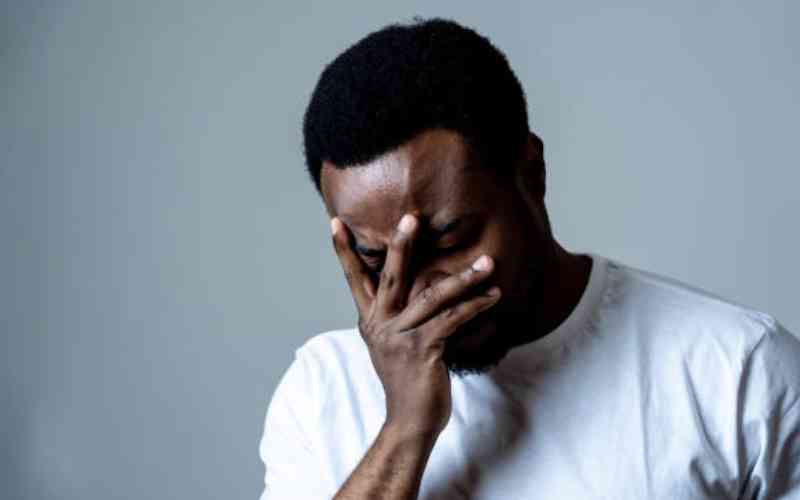
John* never saw it coming. After what he initially assumed was yet another routine visit to the office of the human resources manager, he was in for a rude shock. "Due to the ongoing restructuring, we regret to tell you that you are among...." His mind went blank at some point.
He had served as head of the Audit Department in a beverages company based in Nairobi for seven years. His service was being obliterated by the terse message, the kind of news any breadwinner dreads.
But that was just the beginning of his pangs of distress. In the days and weeks that followed, John's marital world started to crumble.
The solid moral ground he had trod on for a decade was slowly shifting. His wife, who had now assumed the role of a provider started to despise him. Stripped of all dignity, John sank into alcoholism and substance abuse.
The worst was yet to come. "My wife started to demand unrealistic sexual acts that I was not comfortable with," he says. "She even told our two children that I did not just lose my secular job but that I was not of much use in 'many other areas as well. They are teenagers and could fill in the gaps. I felt humiliated."
When we think of sexual assault, we think of women being victims. True, there are more reported cases of sexual violence against women than men. However, the newly released Kenya Demographic and Health Survey 2022 had a curious statistic that pointed to sexual violence against married men.
In a rare disclosure, the report stated that 63 per cent of the married men who had confessed to being victims of sexual violence had suffered at the hands of their marriage mates. Another 32 per cent who had confessed to similar experiences blamed their former wives or intimate partners.
Such information is not to be taken lightly since the document is one of the most important reports in the country that informs government policy and provides the "benchmark statistics on demographic profiles and healthcare status of households in the implementation of the Medium-Term Plan IV (MTP IV) and the country's economic blueprint, Vision 2030".
One expert in marital behaviour says it must have taken these men the courage of an ox to come out and confess to having been sexually assaulted by their wives or past partners.
Why though have men become victims of sexual violence? While the report did not state the form that such violence takes, there are indicators as to the reasons why it happens.
According to Cherly Mwangi, a counselling psychologist with Kidsalive Kenya, any change in a man's social-economic status can be a fertile breeding ground for sexual violence from his wife. She offers extensive insight as to why some men suffer in silence and why society has little remedy for men undergoing sexual violence from their mates.
Some of the men, she says could have undergone what is referred to as Adverse childhood experiences (ACES) that bring out the different kinds of traumas that a child undergoes before the age of 18 and the likelihood of normalising sexual abuse in a relationship.
Sadly, society might downplay how all forms of abuse shape the kind of adult a boy becomes and the relationships that he will commit to.
But in the case of men such as John mentioned at the outset, a family head who cannot provide adequately for his family becomes a special target for sexual manipulation by his spouse.
"A man is defined by his job," she says. "Once he loses his source of income, his status goes with it. His ego becomes fragile and women know how to take advantage of this especially if they are financially stable. A man will be forced to bend the knee so that he can survive and you will find some will blackmail the man even into engaging in coercive sexual fantasies just so he can continue enjoying the privileges in that house."

Mwangi says personality disorders can also create a narcissistic spouse who will use manipulation and gaslighting to get the man to do what she wants. This will include verbal and emotional abuse that leaves a shell of a man, merely existing and easy to manipulate. Such a man will do that which he would normally not have done in his right state of mind.
Then there is alcohol and substance abuse that has made a lot of men fall into the hands of women they had sworn they will not engage sexually with. "Under the influence, the man becomes vulnerable and there are women who already know which buttons to press, making it difficult for a man to resist. It is always followed with regret and self-loathing on the part of the man and many have even been infected with STIs or trapped with unwanted pregnancies," says Mwangi.
Still, how much does it take for a man to acknowledge that he is being sexually abused by his wife? Again, Mwangi has several perceptions that make men coy and keep such matters under wraps.
Mwangi says that society has conditioned men not to speak about such pain. And even when such matters are reported, little action is taken since sexual assault on a man, unlike the physical evidence deduced in a case of a sexually-abused woman, is difficult to prove.
Usually, the emotional and psychological torture a man experiences after being sexually abused, especially by a spouse has led many to depression and even death.
"Come on! Does society even acknowledge a man can be raped by a woman? There is the shame that comes with sexual abuse, the stigma. Do we even have GBV desks for sexually abused men? Forget those whose manhood is chopped off," she says.
She adds: "There are no safe spaces for the African man to be vulnerable, no support system for him to even speak about their real emotions let alone sexual abuse in a relationship. A man's ego is not just bruised but shattered, affecting intimacy, sexual performance and future relationships. He loses his voice completely and when he mentions it to his 'boys', they laugh or ridicule him."
While men may stay in their cocoons, the solution, Mwangi says is to create a safe space for men to open up and stop minimising their trauma.
"Abuse is abuse, and once a man has pointed out they are abused believe them," she says. "If he chooses to confide in you, that will determine if he will find healing or choose to suffer in silence."
 The Standard Group Plc is a multi-media organization with investments in media
platforms spanning newspaper print
operations, television, radio broadcasting, digital and online services. The
Standard Group is recognized as a
leading multi-media house in Kenya with a key influence in matters of national and
international interest.
The Standard Group Plc is a multi-media organization with investments in media
platforms spanning newspaper print
operations, television, radio broadcasting, digital and online services. The
Standard Group is recognized as a
leading multi-media house in Kenya with a key influence in matters of national and
international interest.
